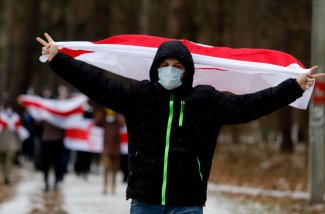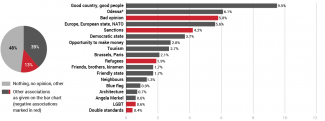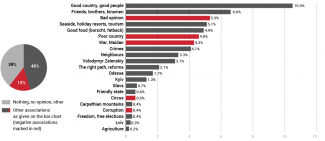Belarusians on Poland, Russia and themselves

Belarus is the only country in Europe where public opinion polls are not published on a regular basis. This is a result of repressive policy of the Belarusian government, which has effectively banned sociological research related to politically ‘sensitive’ topics such as political ratings. This means that little is known about the attitudes of the Belarusian people or their views on political issues. At the request of the OSW and on the basis of questions it prepared, Belarusian interviewers conducted a telephone survey between 26 November and 16 December 2020 with a representative sample of 1000 respondents, the aim of which was to examine Belarusian opinions about selected countries, including Poland and Russia. It should be emphasised that no one has conducted a similarly comprehensive public survey for many months.
The poll’s main findings:
- 43% of Belarusians consider Russia to be the greatest threat to the territorial integrity of Belarus, the highest figure among the countries surveyed (21% of respondents consider Poland’s policy a threat, 20% that of Lithuania, and 18% that of other countries). Paradoxically, this does not affect the very positive perception of Russia (86% of respondents) and the Russian people (96%), or of Vladimir Putin himself, who enjoys the support of 60% of Belarusians. However, the results above may indicate that the perception of Russia in the eyes of the Belarusian people is gradually changing.
- 74% of Belarusians declared a positive attitude towards Poland, and 83% towards the Polish people. 19% of Belarusians expressed a dislike of Poland, and 11% of Poles. The respondents like the Russians, Germans and Ukrainians more (but not the Ukrainian state); Lithuanians less so. Most respondents (52%) view Poland’s policy towards Belarus during the current political crisis in a positive light, while 27% of respondents evaluate it negatively.
- The research shows that for the first time more Belarusians are considering work in Poland (41%) and Western Europe (36%) than in Russia (30%), which for many years has invariably been almost the sole destination of migration. 12% of Belarusians declare some knowledge of the Polish language. Almost a third of the respondents (31%) have visited Poland in the last ten years, while 55% have been to Russia, 45% to Ukraine and 24% to Lithuania.
- For the first time in the history of such studies, many more members of Belarusian society, which is still strongly Sovietised, believe that Belarus should draw upon the historical heritage associated with the Grand Duchy of Lithuania (40%) than the tradition of the Soviet Union (28%).
Detailed results of the poll, with analytical commentary
1. Belarusians on Lukashenka
Although the OSW’s research mainly concerns international issues, we also asked a question about the Belarusian people’s attitude towards Alyaksandr Lukashenka. The president was assessed positively by 27.2% of respondents and rather positively by 13.6% (so in total, 40.8% of all respondents gave positive assessments); 33.4% of respondents gave a negative assessment, and 12.3% expressed a ‘rather negative’ opinion (thus negative assessments constituted 45.7% of the total). It should be noted that a positive attitude towards Lukashenka need not mean political support (the questions did not refer to electoral preferences directly): we may assume that there is a group of Belarusians who have a moderately positive opinion of his rule, but after 27 years they expect political change in the country (according to other studies, Lukashenka is currently supported by 20–25% of Belarus’s population)[1].
It is worth noting that Lukashenka received fewer positive and more negative opinions than the political leaders of other countries we asked about: Vladimir Putin, Angela Merkel, Volodymyr Zelenskiy and Andrzej Duda.
What is your attitude towards Alyaksandr Lukashenka?

What is your attitude towards the following political leaders?

2. Belarusians on other states and nations
According to the OSW poll, the vast majority of Belarusians declare a positive or rather positive attitude towards other nations and states. Traditionally, Russians lead this ranking: as many as 96.2% of respondents favour them. Belarusians also have an unambiguously positive attitude towards Russia: a positive or rather positive attitude towards Russia was declared by 86.7% of respondents, and a negative or rather negative attitude was declared by only 9.1%.
The respondents’ attitude towards Vladimir Putin (60.2%) – the most popular of the leaders we asked about – is also positive, although he also has a noticeable group of critics (27.3%). His high popularity is not only the result of the respect for Russia historically rooted in the Belarusian consciousness, but also the intensive activity of Russian television, which can be received throughout Belarus.
Most of the respondents also favour Russian-Belarusian integration within the Union State: less than a quarter of Belarusians expressed a negative attitude to this structure (including 15.8% who were clearly negative). The Union State is more popular than the European Union (although it also enjoys the sympathy of most respondents) or NATO, to which Belarusians, in line with the regime’s propaganda, are overwhelmingly negative. Belarusian society appears divided over how much farther Russian-Belarusian integration should go.
What is your attitude towards the following countries?

What is your attitude towards the following nationalities?

What is your attitude towards the following political structures?

Are you in favour of deepening the integration of Belarus and Russia within the Union State?

Belarusians in this poll declare a favourable attitude towards Poland, which is assessed positively by 59.4% of respondents, and rather positively by 14.1% (for a total positive rating of 63.5%). Their attitude towards the Polish people seems even better, as it seems less burdened by the current political context: 74.4% of Belarusians assess the Polish people positively, and 8.5% rather positively (82.9% in total having positive opinions). These results show that there are no deeply entrenched negative stereotypes which would hinder Polish-Belarusian relations.
This is confirmed by the responses to questions about how other nations perceive them: 70.9% of respondents believe that Poles assess Belarusians positively, while 12.9% perceive a negative attitude. Although this result is very positive, it is also clearly worse than the cases of Belarus’s eastern neighbours: up to 91.2% of the respondents believe that Russians have favourable feelings towards Belarusians, while only 3.2% perceive a dislike.
How do you think representatives of the following nations perceive Belarus and the Belarusian people?

When analysing the degree of Belarusian sympathy and antipathy towards Poland and the Polish people compared to other countries and nations, it is noteworthy that Poles enjoy less sympathy than the Germans, towards whom there is little distrust. A total of 28.5% of respondents declare a negative or rather negative attitude towards Poland, while the figure for Germany is only 10.8%. The difference is smaller when assessing nationalities and not states (the total negative opinions of Germans add up to 6.9%, compared to 10.9% for Poles). There are several keys to interpreting this state of affairs: the positive image of Germany and the German people is the result of Germany’s strong ‘soft power’ rating, deriving from that country’s stability, prosperity, high organisational culture and the high potential for investment associated with it; but it is also an effect of Lukashenka’s anti-Western propaganda, which has focused much more on criticising Belarus’s immediate neighbours, Lithuania and Poland (as well as the United States, which are most critically assessed in the poll), together with the lack of any bilateral German-Belarusian tensions. This is also confirmed by the very high level of trust which Belarusians express for Chancellor Angela Merkel.
Poland and the Poles, although placing behind the Germans, are assessed more positively by Belarusians than Lithuania and the Lithuanian people. The cultural proximity between the Polish and Belarusian nationalities seems to influence this. It is also worth noting the very positive attitude of Belarusians towards Ukrainians (probably as a related, Slavic nation which speaks similar languages), in tandem with their much less favourable assessment of the Ukrainian state (due to the two revolutions, which were criticised both by Belarusian and Russian state media).
The data quoted above concerning Belarusian sympathy towards Russia confirms that the social protests in Belarus that have been taking place since August 2020 do not have a geopolitical edge, as was the case with the Revolution of Dignity in Ukraine, and that Russian support for Lukashenka has not had a noticeable influence on the Belarusian public’s attitude towards Russia and the Russian people. This was confirmed by a more detailed question. It turns out that although the majority of Belarusians have a negative attitude towards Lukashenka, most of them positively evaluate Russia’s policy towards Belarus during the current political crisis, which in fact boils down to supporting the rule of the incumbent president. The sum of positive and rather positive assessments of Russia’s policy is 52.2%, while for Poland this indicator is 51.7%, for Germany 51%, and for Lithuania 44.4%.
How do you evaluate the policy which the following countries have adopted towards Belarus during the current political crisis?

The poll shows that 20.7% of respondents believe that Poland poses a threat to the territorial integrity of Belarus, while 67.4% do not express such concerns. The scale of the threat from alleged Polish territorial revisionism should be assessed as moderate, considering that accusations that the Poland wants to annex the Grodno region (or even to restore the 1921–1939 border delineated by the Treaty of Riga) have constituted the main axis of anti-Polish propaganda in recent years, especially since the outbreak of political crisis in August 2020.
As many as 42.8% of respondents are inclined to see Russia as posing a threat to Belarus’ territorial integrity, which is an unprecedentedly high figure. Interestingly, however, this does not translate into negative attitudes towards Russia or Vladimir Putin. This is a manifestation of a perception of reality which is typical of Belarusian society, while surprising for external observers. The Belarusian people, more or less consciously, perceive themselves as a nation situated between East and West, i.e. at the meeting point of different civilisations, which leads to a specific combination of opposites.
This paradox is probably the result of the collision between the fear of peaceful Belarusian citizens about the Kremlin’s aggressive policy in the post-Soviet area (especially in the context of the war in Georgia in 2008 and the annexation of Crimea in 2014) and their respect for Putin, who is presented in the Russian media (popular in the country) as a strong and efficient leader. However, this result also demonstrates that the perception of Russia in the eyes of Belarusians is gradually changing, mainly because of concerns about Belarus’ security, as regularly expressed by Lukashenka and the state media, especially during the last election campaign.
Do you think that the policies of the following countries threaten the territorial integrity of Belarus?

The only open question in the poll concerned the Belarusian public’s associations with Poland, Russia, Lithuania, Ukraine and the EU. Regarding each of them, the vast majority of responses can be classified as positive. The highest percentage of negative responses concerned Russia (‘dictatorial regime’, ‘low living standards’, ‘corruption’, ‘aggression’, etc.), totalling 15.8%. This means that some respondents had a negative first association with Russia, while declaring a positive or rather positive attitude towards it and the Russian people. This is another example of the above-mentioned contradictions in the Belarusian understanding of reality.
The lowest level of pejorative associations (‘traitors’, ‘unfriendly’, ‘insolent’, ‘stingy’, etc.) concerned Poland, amounting to 6.6%. In the case of Ukraine, the cumulative negative indications accounted for 15.2% of the total; this should be considered a moderate response, considering that Ukraine is a constant target of Belarusian and Russian propaganda. Negative assessments of the EU and Lithuania accounted for 12.9% and 8.6% respectively. It should also be noted that in the case of Russia, a lack of response was much less frequent (19%) than in the cases of Ukraine (34%), Poland (38.2%), the EU (42.7%) and Lithuania (43.3%); this confirms that Belarusians know Russia best. This is reflected in the results concerning travel abroad by residents of Belarus, discussed below.
What do you associate with Russia?

What do you associate with Lithuania?

* Response as given in the original.
What do you associate with Poland?

What do you associate with the EU?

* Since the Soviet period, Odessa has been associated with being a great international port, Western goods, and as a European-style city.
What do you associate with Ukraine?

3. Belarusians on economic migration and the Polish Card
One of the poll’s most surprising results is Poland’s promotion to first place among the countries where Belarusians would like to work. Up to 40.6% named Poland, ahead of Western Europe (36.7%), Russia (30.3%) and Lithuania (21.3%). This is probably the result of the economic stagnation in Russia, as well as the Belarusian migration networks in Poland that have been emerging in recent years. These results suggest that we should expect a rise in the migration of Belarusians to our country, especially if the economic situation in Belarus deteriorates further and the no political breakthrough is achieved there.
Are you considering working abroad, and if so, where?

One factor affecting the size of Belarusian migration to Poland is the rapid increase in the number of people holding the Polish Card.[2] This has happened despite the regime’s negative attitude towards it, (including legally prohibiting some officials and uniformed services from holding one), and the presentation of the Polish Card in state propaganda as an instrument of ‘Polish imperialism’. The OSW’s poll shows that 62.1% of Belarusians have a positive or rather positive attitude towards the Polish Card, and only 13.8% have a negative attitude. This document is familiar to the great majority of Belarusian society: only 12.5% of respondents stated that they did not know about it, and 11.6% that they held no opinion about it.
The poll shows that 30.5% of Belarusians have visited Poland over the last decade. This percentage is lower than for the other neighbouring countries, which do not require visas: Russia (55.7%) and Ukraine (45.6%). However, it should be noted that Poland has been visited by more Belarusians than Lithuania (24.3%), whose capital Vilnius is located only 30 km from the Belarusian border, two and a half hours by car from Minsk. In the past decade, even fewer respondents had visited another EU country (19.7%).
One factor facilitating Belarusian migration to Poland is knowledge of the Polish language, as declared by 11.9% of the respondents. However, this should be viewed as general comprehension rather than fluency in use. This is indicated by the fact that as many as 54.5% of respondents claim that they know English, something which is unlikely due to the small scale of travel abroad (for comparison, 53% of Poles declare knowledge of the language).
Which foreign languages do you speak? (multiple choice question)

Which countries have you visited in the last 10 years? (multiple choice question)

4. Belarusians on their historical tradition
Over the last dozen or so years, the Belarusian people’s attitude towards their historical tradition has been changing rapidly. While until the beginning of the 21stcentury (with a slight break in the years 1991–1994), according to the official narrative and school textbooks, the first state was the Belarusian SSR, in the following years the authorities began to reach back to earlier periods, including the medieval Principality of Polotsk and the Grand Duchy of Lithuania, which has also begun to be perceived as a Belarusian state. (We discussed this process in the OSW’s recent report Opposites put together. Belarus’s politics of memory). The poll results show that this trend is strengthening. Many more Belarusians believe that their state should draw upon the traditions of the Grand Duchy of Lithuania or the Polish-Lithuanian Commonwealth (39.7% and 6.3% respectively) rather than the Soviet Union (28%). Attention should also be paid to the very good result for the Belarusian People’s Republic (16.2%), the short-lived entity which resulted from an unsuccessful attempt to build an independent and anti-communist Belarusian state in 1918.
What historical tradition should Belarus primarily draw upon?

[1] One example is Belarusians’ views on the political crisis, Chatham House, November 2020.
[2] The Polish Card (Karta Polaka, literally ‘the Pole’s Card’) is a document granted to citizens of foreign countries who have Polish roots, can prove it, and who declares that they belong to the ‘Polish Nation’. A holder of a Polish Card has some privileges, including the rights to work legally in Poland, and be educated in Polish schools and universities without any fee. More than 140,000 members of the Polish minority in Belarus and around 130,000 in Ukraine have already received Polish Cards.




